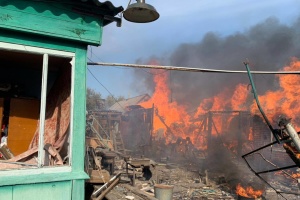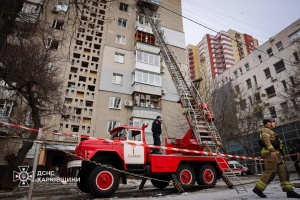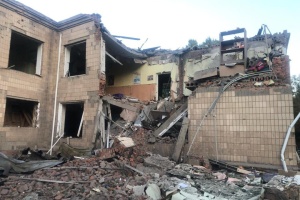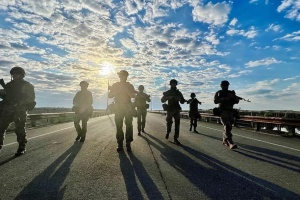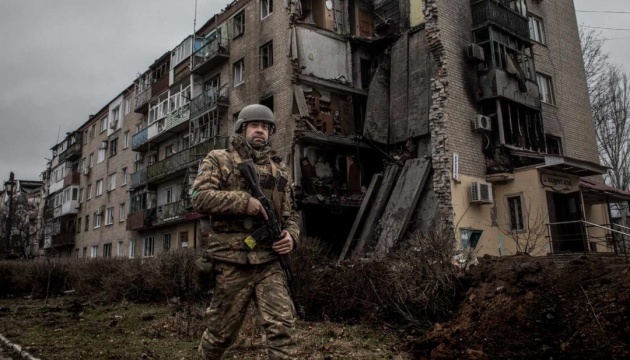
Transcarpathian TRO fights, jokes and drinks best coffee
Oleksii Lyubetskyi is a combat medic with the fire support company of the 68th separate battalion of the 101st Transcarpathian Brigade of the Territorial Defense Forces (TRO). Together with his unit, he has been to the front, as they say, "to the moon and back" for a year and a half of full-scale war. Already in early March 2022, they received unforgettable impressions of Russian air raids in Okhtyrka, Sumy region. In the summer, the Izyum direction was difficult, but in the fall, we saw the unexpected Kharkiv counteroffensive. And this winter - the hot outskirts of Bakhmut.
However, when he talks emotionally about the history of his unit, the "Italian" mostly jokes. According to him, the war and service in the army are 90% routine: dig trenches, stand in line, cook, clean... But Lyubetskyi knows how to diversify this routine: volunteering, getting the necessary "optics" and cars, negotiating with the Ukrposhta and famous muralists to glorify the two heroes who put down a platoon of "Wagnerians" near Bakhmut...
Oleksii and I meet in the rear of Mukachevo, where several dozen people have come to a local pub to spend the evening with him. Lyubetskyi enthusiastically tells war stories about the adventures of "the most famous Ukrainian army unit in New Zealand" and dreams of being able to recruit people to join the battalion after such meetings.
HOW A NARROW-GAUGE RAILWAY MADE THE TRANSCARPATHIAN TRAIL FAMOUS IN NEW ZEALAND
Oleksii Liubetskyi, a media personality, was widely known for his projects in narrow circles of narrow-gauge railroad enthusiasts in Transcarpathia and beyond. Transcarpathia, which was part of the European world until the mid-twentieth century, had a network of narrow-gauge railroads. However, only a part of it has survived to this day, and even that is in a barely living condition. This is the famous Borzhava narrow-gauge railway, which connects Khust and Berehove administrative districts in the Borzhava river valley.
Two years before the full-scale war, Oleksii restored traffic on the railroad as best he could: he built a dray and occasionally ran on it. Thanks to the narrow-gauge railroad, the Italian managed to make his fellow soldiers in the unit media.
- Among those who are close to the idea of reviving the narrow-gauge, 90% are from the British world. This is how I met Jarrod Godson from New Zealand. He is a local deputy who has laid 15 meters of track in his yard and rides tourists on a dray on it. There is a wonderful view of the bay, and he managed to get his "railroad" marked on the world map of narrow-gauge railroads as operating. It looks something like this: "Do you have a railroad at home? I do!" He organized a couple of TV interviews for us in New Zealand. Thanks to this, we managed to raise some funds, and thus we became the most famous unit of the Ukrainian TRO in New Zealand.
Oleksii says that foreign audiences are interested in him as a man who revived the narrow-gauge railroad and joined the Ukrainian army with the full-scale invasion. European reporters also came to the unit to make reports: Italian, Spanish, and British.
- The Italians, the soldier adds, are quite diplomatic in their interviews, but in the British world, journalists are more direct. On the air, they literally asked us to tell them that you will tear them apart! Literally, it sounded something like this: "Well, now tell us, Oleksii, when are you going to kick the Muscovites' asses there?" Everything is very clear.
Lyubetskyi says that his long-held dream of working on a narrow-gauge railroad keeps him warm at the front when his hands are down.
THE BEST COFFEE IN THE UKRAINIAN ARMY
I ask Oleksii Lyubetskyi why he is an "Italian" in the Ukrainian army.
- I lived in Italy for a long time and returned to Ukraine in 2010. I got this call sign back in the Ukrainian Legion [a non-governmental organization that conducts training in tactics and the basics of weaponry - author], where I joined in 2017. When you live in another country for a long time, you ape the people there, "mirror" them. Although I lived for a long time in Spain and, what can I say, in Chukotka, I called myself "Italian". And this is not only because of my spontaneity and emotionality. It's also because of certain preferences: for example, I like delicious food and a certain order in its consumption - I won't drink cappuccino after 11 o'clock or coffee before a meal. I try to stick to this on the frontline. We even have our own brand - "Coffee of the Fire Support Company" (FSC), which is provided by some of the best coffee shops in Uzhhorod. We sell it, and the proceeds go to the current needs of the unit. That's why I have my own small coffee machine and drips in the trenches.
- The best coffee in the army is in the Transcarpathian TRO, I get it!
- Of course it is. Lviv is known for its coffee shops, and Uzhhorod for its coffee," Oleksii repeats one of the main Transcarpathian "laws".
Lyubetskyi says that once every month and a half, the soldiers receive a pineapple in their food package, in addition to meat, vegetables and the usual fruits.
- This is from the state. And from the volunteers we get a lot of goodies, Transcarpathian local food and specialties. Once we were brought to our position Sehidyn goulash [a traditional dish of sauerkraut and smoked sausages, which migrated from Hungary to Transcarpathian cuisine - author]! We in the unit joke about it in such cases: "If possible, try to be born in a rich family or in Transcarpathia, and if you go to serve, get into the Transcarpathian TRO.
"I WAS SUPPOSED TO SERVE IN THE LUMSHORY, BUT SOMETHING WENT WRONG"
Oleksii Lyubetskyi was expecting a big war, so he went to the military registration and enlistment office at the beginning of the invasion.
- "I came with two pairs of boots, demi-season and summer, a uniform, tactical pants, a helmet, a turnstile and an understanding of how to use it. That's how I became a combat medic in a fire support company. I do not have a medical degree, I have tactical training. Since the beginning of the invasion, I have fired twice at the positions. But I'm a combat medic, so it's normal. When my comrades in Klishchiyivka [a village near Bakhmut - author] fought with the Russians for 9 hours without a break, they were 10 meters away from the enemy, and I was 500 meters away from them, at the evacuation point. Although I also had trips to "Zero", where my comrades and I took the bodies of our soldiers, I consider my army experience to be relatively modest. If I evaluate my service in the army on a scale from zero to ten, where 0 is the Uzhhorod military enlistment office and 10 is assault brigades, I give myself a 5 to 7 in different situations. As the saying goes, he was supposed to serve in Lumshory [Lumshory is a resort in Transcarpathia, known for its mineral water vats - author], but something went wrong," the "Italian" jokes.
Serving in the TRO, and in the army in general, is mostly boring, says Oleksii.
- "It's 90% routine: cooking, digging in, give orders, digging garbage pits, going to buy food... The only thing I don't like in the army is the treatment of some as "white" and others as "black", and I always criticize this very harshly. Although, since we are a TRO unit and the vast majority of our personnel are civilians, we do not have a military ethos. Our commander is a former teacher, and we communicate with him in Spanish most of the time," says Oleksii.
TRANSCARPATHIAN SUBCULTURE IN THE ARMY
I wonder how true are the stories about Transcarpathians at war - that they can talk into the radio without hiding, because the Russians do not understand the dialect and do not know what they are talking about.
- This is, of course, more of a military fable than a practice, because in the combat zone, they communicate very little on radios so that the enemy does not have time to locate them, and they speak very quickly and to the point. Our battalion has another trick: we call the points on our positions by Transcarpathian place names. For example, like the villages in Perechyn district - Simer, Zarichevo, Bereznyi, Vorochevo. This tradition travels with us from trench to trench.
However, the soldier says, there is a thing: whatever you add the word "Transcarpathia" to, it immediately becomes a meme.
- It's like with the Transcarpathian code language in walkie-talkies. We are currently holding a large-scale fundraiser for the battalion, buying 68 FPV drones, so we say that this is a fundraiser for the Transcarpathian Air Force. It would also be great if we had satellite imagery data in some areas - then we could talk about the 'united Space forces of Transcarpathia'," laughs the Italian.
After the Victory, they dream of creating a monument in honor of their separate 68th Battalion.
- It will be a wall with "rock inscriptions" about episodes from the battalion's life that only those who served in it will understand. For example, one of our fighters with a baseball bat. Or another who shot at drones - and hit them!
- "Is this subculture in the army a rule or are you in the Transcarpathian TRO rather an exception?" I ask Oleksii.
- "We talked to other units, and there are much fewer "jokes" like ours in Zakarpattia. But to talk about their peculiarities, you need to be inside.
You really know something and can only talk about your unit, the soldier emphasizes. - "It's very annoying when you come to the rear and they start asking you to tell them what's really going on at the front, you're from there! And you know only about your own part of the front, and you learn about everything that happens beyond it from the news and TV channels. Or you can ask your friends if they are in positions nearby. General Zaluzhnyi doesn't write to us every morning in the work chat: "Okay, guys, today we are taking this village, what do you think, your thoughts, suggestions?" and you don't write back, saying, "I think I would rather take this village than this one today. Therefore, if a soldier from the frontline "reliably" describes the situation at the front, you should not believe it," Lyubetskyi assures.
Combat medic "Italian" follows this rule in his work: he often explains to his comrades that he is not a doctor and will not give them injections or pills for headaches or diarrhea.
- They often come to me as a doctor, but I usually redirect my comrades to the medical center, or, more seriously, I just load them into the frontline ambulance and take them to doctors. They say, "Dude, can't you give me a shot yourself?" I answer that I can and do apply a tourniquet and stabilize the wounded, but I would prefer to do it as little as possible. I explain that just because I am called a medic, it does not mean that I am a doctor. We should be more professional in society and mind our own business, and maybe something would change for the better," says "The Italian.
I ask him to tell me about situations when he had to use his skills.
- In fact, I haven't had that many, and that's great, because it's like firefighters - the less you work, the better.
His first combat experience was literally traumatic, because he ran to save his comrade and came under fire himself.
- It was the Izyum direction and a cluster attack. A cluster is a thing that explodes after a certain time, from 30 seconds to 5 minutes. A series of explosions, and you just count those minutes. Well, I miscalculated. When the shelling started, my comrade was just going to the toilet. I saw that he was wounded and ran to him - and a second later another cluster shell came. A tree saved us, but it hit both him and I. Small fragments hit the side of my body, but I got off with a slight scare and small fragments that will stay with me forever, and he had his spleen and kidney removed. I often replay that morning in my head: I would have done everything differently now, but what was - is gone," says the combat medic.
He says the most painful moments he experienced during the war were when he had to take the bodies of his comrades and fighters from other units from the battlefield.
- In the army, your comrades are your pack. The unit replaces your family, friends, colleagues, you are connected and responsible to each other. If these people are not from my "pack", no one on the war will condemn me for not going to pick up bodies under fire, endangering my life. Everyone understands everything. But we usually do it so that we can feel human afterwards," the soldier says.
NINE-HOUR BATTLE NEAR BAKHMUT
As of now, the battalion suffered the most losses in the winter in the Bakhmut sector.
- We were attached to another battalion, and I was on duty as a combat medic at the evacuation point. Our machine gunners had been fighting for 9 hours and were ready to blow themselves up with a grenade because they were running out of ammunition. These were the same assaults of the Wagnerites, when the first ones ran to dig without armor and weapons, the second ones carried ammunitions over their bodies, and the third ones later stormed the positions more or less professionally over the corpses of the first and second ones.
They were opposed by Kharkiv guys, not Transcarpathians, who joined the ranks of the Transcarpathian TRO after being evacuated in the first days of the war. They are heroes for me. Real heroes.
Later, in honor of these guys, says Italian, the battalion, in cooperation with Ukrposhta, issued a stamp. They also plan to paint a mural in their honor in Perechyn.
- Sometimes they award the wrong people for the wrong reasons. I know, for example, a person who was hiding on the roof of a house to avoid going to the positions, but received the award later. There was a friend who did not have time to sober up between shifts. He didn't seem to drink all the time, but somehow managed to "take it" when it was time to go on duty. Thus, every time some "mix-ups" bypassed him, because at that time he was undergoing disciplinary punishment. There are enough of them in any society. In Italy, there is a great saying about this: "The mother of assholes is always pregnant," says The Italian.
The uniform, he notes, is not a "panacea": if someone was drunk or behaved unworthily in civilian life, he will do the same in the army. But there are more decent people.
- The average age in our battalion is 35. These are people who were formed during the time of independence, some of them had their own businesses. That's why we don't have any kind of sovietness. I'm delivering a generator to my brother-in-law right now-he's very angry with me and said I should cut out my tongue because I talk too much, but we're on the same team. He is, in fact, a very powerful man. One day I went to their yard in the village where we were staying, and he was digging a two-by-two pit. I was amazed and asked him what he was doing. "First of all, I got bored, and secondly, we still need a garbage pit," he replied. "Well, I haven't met many people in my life who dug a two-by-two pit when they were bored," says the Italian.
I DREAM OF CREATIVE EVENINGS AFTER WHICH PEOPLE WOULD RECRUIT TO THE BATTALION
Oleksii Lyubetsky's superpower as a combat medic is volunteering. During the full-scale operation, he obtained various items for his battalion, from night vision goggles to an armored Medevac. Now a large-scale collection for 68 kamikaze drones is underway.
- I can do it, I have good results, and that's why I do it. I monetize my networking from my previous life, keep in touch with people, and coordinate. This volunteering has a part of healthy egoism in it: I do it for myself as well. If I ride in armor, at least 10 other people will also ride in armor with me. That's why it was so important for us to get this Medevac, and it cost a lot - USD 50,000. Then there was a night vision device - it cost USD 7,000, we got it thanks to our British friend. Then we bought a tactical stretcher, which we mounted in the Medevac. Colleagues from the bank gave us their collection vehicle as part of our fleet. A powerful flashlight for the anti-aircraft gun. Lots of goodies, coffee. It's a continuous story," Oleksii lists.
I ask how they manage to get all these treasures now, when there are fewer and fewer donations from people and businesses.
- We organize campaigns. Our command is great, they support us, so we are able to hold them. I don't like to ask civilians for money just like that, so we organize different stories, like with the Fire Support Company coffee or with Ukrposhta stamps about our heroic brothers.
- Is it easy to get to you if one suddenly wanted to join this 'Transcarpathian dvizh' in the army? I ask finally.
- "We need people in the battalion, but currently there is no clear mechanism for recruiting to a specific unit, and it is not very easy to do without connections. It is our dream to organize a "creative evening" with the battalion and then immediately hire those who would like to join our ranks. The army is mostly a routine, you don't immediately get into the movies you used to see in the videos of stormtroopers from the "GoPro". In our battalion, for example, there are two positions of bath attendants who have to take care of the bath and laundry complex. There are logisticians and those who work with documents. Oh, and we had a cook! Let's call him Gonza. "I'm not cooking today, I'm not in the mood" [imitating the language of the Transcarpathian Hungarians]. When he was inspired, we ate a wonderful bograch-goulash, but that was once every two weeks. Of course, they changed the cook," Oleksii says.
"The Italian emphasizes that those who are currently at the front will have to be replaced anyway: the guys are exhausted both physically and mentally.
- "I have many friends who are holding the economic front now and are actively helping us. But from time to time I tell them: guys, be prepared, because we will not last forever. When someone starts saying things like "let the children of MPs serve," I say goodbye to them. Yes, the army has not the best management in the country. But it is changing, and when something goes wrong, it is a question for everyone. We are all in this system.
Oleksii, who once worked for an Israeli company, gives an example from his experience there.
- In a way, I am a fan of this country, although I do not idealize it. We are slowly turning into Israel, but I want it to be better and faster. There are also a lot of former communists there, with their "DNR", who almost fucked up their independence, but they got their bearings in time. Now it's a country of military and startups, military and hi-tech are their everything. An ancient nation that has found its place in the modern world. Plus, what fascinates me is their interactions in society. They have a common question when you meet them: "What did you do in the army?" If you tell them, everything is clear about you.
- We already have and soon will have a more expressive question when we meet: what did you do during the war? When you ask and they say something like "I was holding the economic front," will it bother you?
- I do not believe that everyone should serve and be in the army. Moreover, I don't believe that if they catch another drunk or corrupt official, they should be sent to the trenches! You know the joke: Petro had the call sign "Terminator" because he was found naked on the street five times. We do not need such "terminators" in the army. If you are a citizen of Ukraine, you must be ready to defend the country and master the necessary skills. This is the base. For everyone in the country. It's the same as paying taxes. You don't like it? Okay, but then it will be difficult for you to live in this country in the future. You have to make up your mind.
Tetiana Kohutych, Uzhhorod
Photo by the author and from the archive of Oleksii Lyubetskyi

